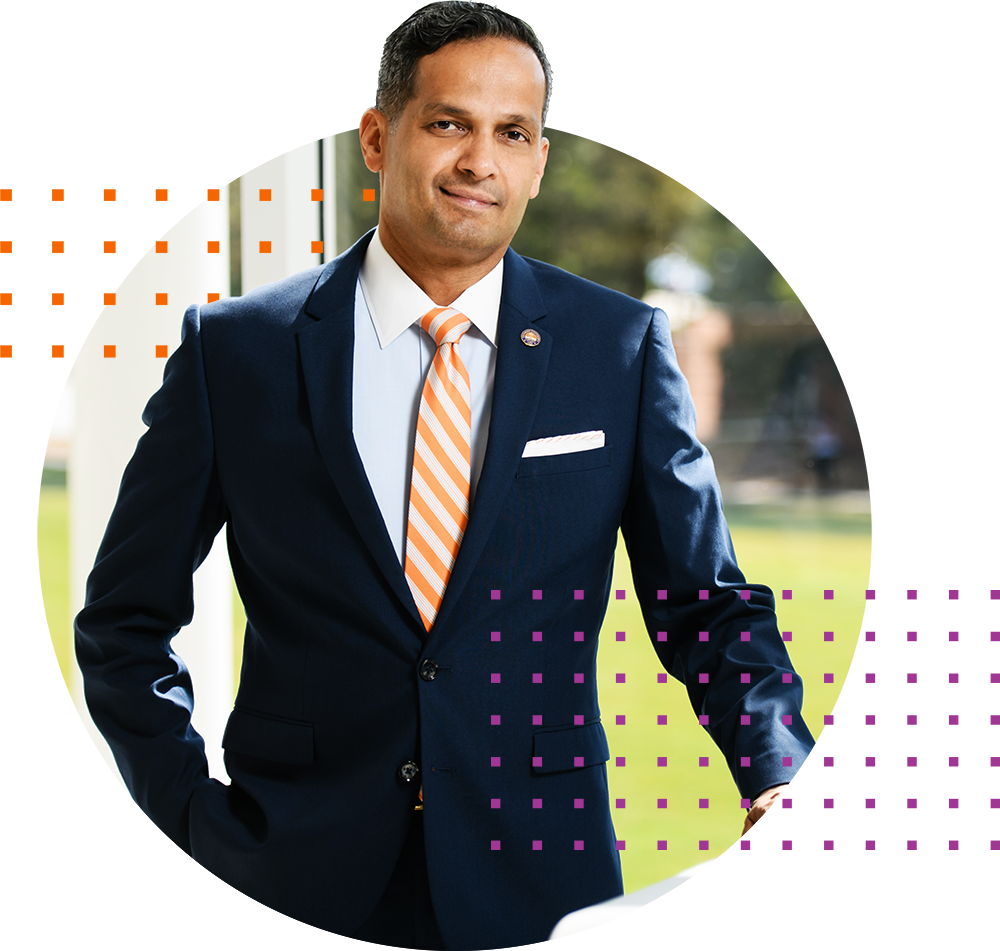IDEAS MAGAZINE: SPRING 2021
A message from the Dean
This past year has certainly highlighted the importance of collaboration and teamwork in addressing today’s challenges.

We in the College of Engineering, Computing, and Applied Sciences have long recognized the impact of bringing together teams that capitalize on the strength of diverse areas of expertise, and this issue of IDEAS focuses on several of our recently formed partnerships involving multiple disciplines and representatives from government and industry. To each of these partnerships, the college brings its deep knowledge and experience in areas ranging from advanced materials and sustainable energy to advanced manufacturing and national security. While the college’s researchers are leading these initiatives, we recognize and appreciate the value that our partners add as we work toward the common goal of preparing the future workforce.
One such project expands on our success in the design and development of high-quality, cost-effective e-learning tools for the education of the automotive and aviation manufacturing workforce, two of the country’s largest tech industries. This new project, a collaboration with the National Science Foundation referred to as A2, builds on the success of Clemson University’s Center for Aviation and Automotive Technological Education using Virtual E-Schools (CA2VES) and its partnerships with various South Carolina and Florida technical colleges and such companies as BMW, Michelin, and Lockheed Matin.
In addition, this issue includes a series of videos featuring the leadership of the new Virtual Prototyping of Ground Systems (VIPR-GS) Center. As part of the center, more than 65 faculty members and about an equal number of graduate students are partnering with the U.S. Army Ground Vehicle Systems Center in the development of the next-generation of combat vehicles, focusing, in part, on the development and prototyping of autonomous vehicles for use in unknown off-road environments. Another project featured in this issue focuses on researchers from six universities who are developing new technology capable of controlling the direction of light. Referred to as orbital angular momentum, it opens a wide range of possibilities, including new ways of communicating and gathering data in fog, murky water, and air turbulence.
Other projects in the college will have an impact on a more personal level. School of Computing faculty members are conducting research at the intersection of artificial intelligence and cybersecurity. Systems they have developed are aimed at enhancing online privacy, protecting social media users from cyberbullying and deterring hackers trying to access cameras and other devices too small for traditional anti-virus software. Further, an interdisciplinary team of students and faculty members are working with cancer survivor Bill Paseman on what they hope will lead to new treatments for cancer. They used deep learning to show at a genetic level how Paseman’s rare kidney cancer is unique to him, publishing their findings in the journal Patterns.
Finally, I would like to acknowledge February’s Black History Month and Women’s History Month in March. As a college we continue to support and improve our programs that serve underrepresented populations, and in this issue we highlight some of those critical efforts.
As you have noticed, this issue of IDEAS is special. For the first time, this publication is all digital. The change allows us to seamlessly feature videos and links to additional information, all packaged in a new, intuitive design. By going all-digital, we also enhance our capacity to reach you online where many of you go for your news and information. I hope you enjoy the convenience of this new format.
Our success is possible only because of our many alumni, friends and supporters, and this issue highlights some of them. These gifts help support a range of our critical needs, ranging from scholarships for unrepresented groups and engineering majors interested in entrepreneurship and design to support for summer sessions to extend the curriculum for students needing extra time to master calculus and programs providing mentoring. As always, I deeply appreciate these donors as well all of you who have supported the college with your time and treasure. As a result of your generosity, we are well positioned as we conclude this academic year and look forward to the fall when I hope I will be able to welcome you to campus again. Until then, please stay safe and healthy.

Anand K. Gramopadhye, Dean
Clemson University
College of Engineering, Computing and Applied Sciences